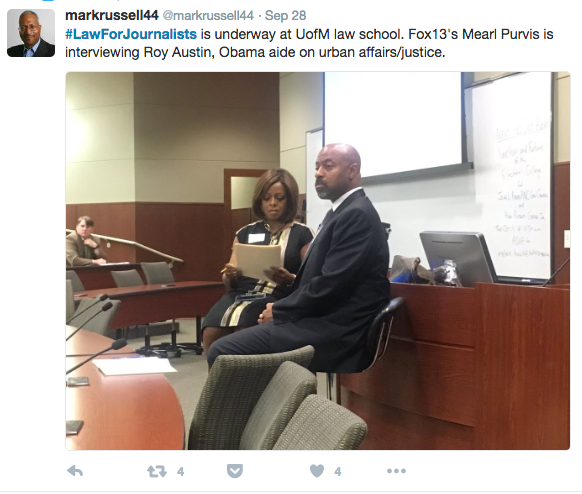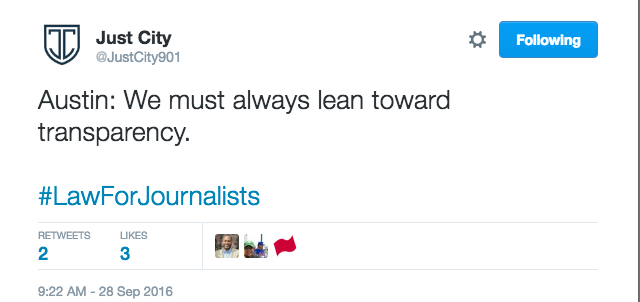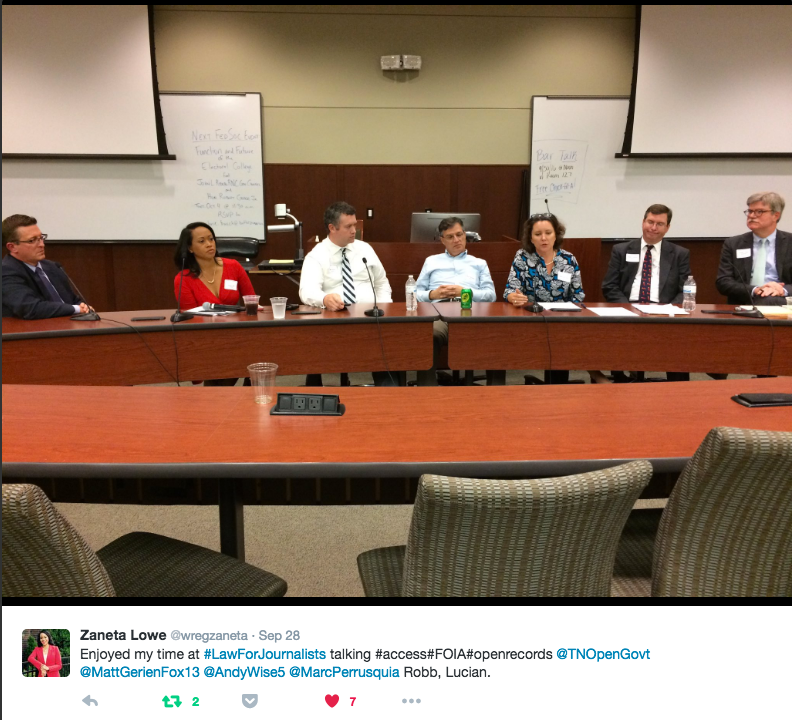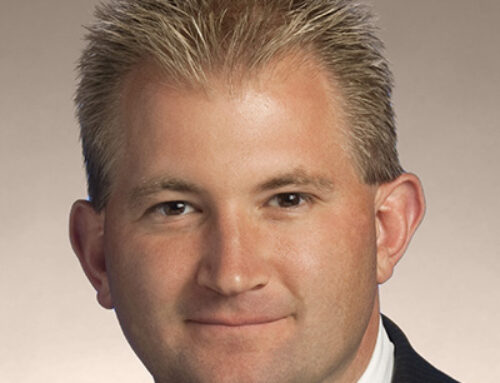In Memphis this week, about 80 news reporters, activists, attorneys and college students came together to examine how media can, should and does cover police shootings.
The centerpiece was the case of 19-year-old Darrius Stewart, who was shot and killed last year by Memphis police officer Connor Schilling after a traffic stop, sparking protests and concerns from the African-American community.
The daylong workshop, developed by the Memphis Bar Association, comes at a time of national attention on police shootings, driven often by dramatic video recorded by bystanders and family members. The video and circumstances around the shootings have raised questions about the use of lethal force and racial bias. (See: Unarmed black men are seven times more likely than whites to die by police gunfire.)
 Some activists at the workshop challenged media members to dig deeper into social justice issues regarding police. Others urged media to resist so much negative crime news about minority communities, which perpetuates stereotypes.
Some activists at the workshop challenged media members to dig deeper into social justice issues regarding police. Others urged media to resist so much negative crime news about minority communities, which perpetuates stereotypes.
Participants also heard from a top Obama official about the president’s Task Force on 21st Century Policing, and his views on transparency and accountability.
Body cameras are one new tool that can increase accountability and also protect police from false accusations, said Roy L. Austin Jr., director of the White House Office of Urban Affairs, Justice and Opportunity. But it’s a new technology for police and many details still need to be worked out.
For example, Austin, a former prosecutor, said law enforcement would not want to release footage of a police shooting until it has interviewed all of the witnesses to avoid people tailoring their statements to the video.
But when asked about citizen rights see such video, Austin replied, “Body camera data, who does that really belong to? Does it belong to the police department? Does it belong to the prosecutor’s office? Does it belong to the people and the community? The lean has to be the community. This is their video footage. This is what is happening in their communities.”
Austin said the 21st century policing task force involved rank-and-file law enforcement and came up with 59 recommendations to improve policing. Now the job is to convince 18,000 local police departments across the country to start adopting some of the practices.
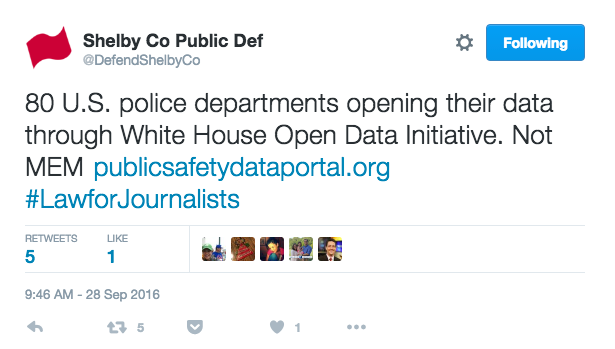 Much of the daylong seminar, held at the University of Memphis Cecil C. Humphreys School of Law, focused on the Stewart case in Memphis, access to information and public records, and Shelby County District Attorney Amy Weirich’s decision to file a petition to open up the TBI investigative report on Stewart’s death.
Much of the daylong seminar, held at the University of Memphis Cecil C. Humphreys School of Law, focused on the Stewart case in Memphis, access to information and public records, and Shelby County District Attorney Amy Weirich’s decision to file a petition to open up the TBI investigative report on Stewart’s death.
Also see:
Commercial Appeal: White House official visits Memphis to discuss body cameras, community policing
Commercial Appeal: Weirich, attorneys and judge discuss Darrius Stewart case
Weirich had recommended the grand jury indict Schilling on a voluntary manslaughter charge, but the grand jury declined. With the case over, Weirich took an unprecedented step to successfully petition Chancellor James R. Newsom III to allow disclosure of the TBI investigative report to the public. Newsom agreed and Weirich posted the file on the DA’s website.
(Read Newsom’s order here: Judge James Newsom’s order to release TBI file.)
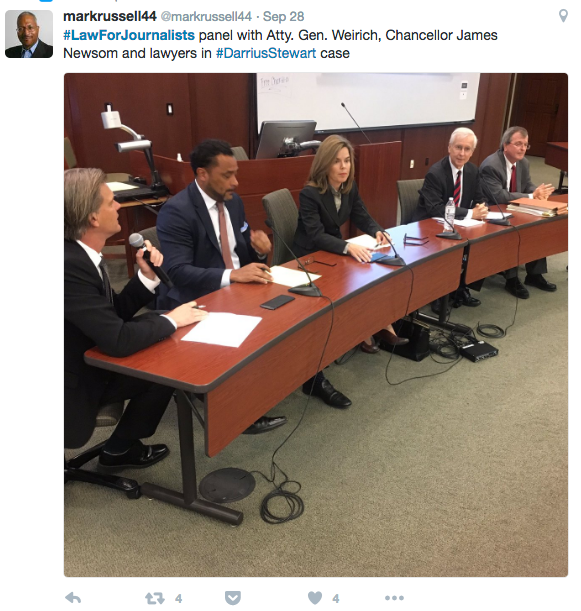 Weirich’s move laid bare a problem with an exemption in the Tennessee Public Records Act passed more than 50 years ago. That exemption makes TBI’s investigative records confidential forever, unlike local police and sheriff’s department records which are open once a case is over.
Weirich’s move laid bare a problem with an exemption in the Tennessee Public Records Act passed more than 50 years ago. That exemption makes TBI’s investigative records confidential forever, unlike local police and sheriff’s department records which are open once a case is over.
Because TBI investigates most officer-involved shootings in the state, the exemption essentially makes secret the details and evidence surrounding such deaths at the hands of police unless a case goes to trial. Few do.
Nashville and Knoxville still conduct their own investigations when an officer shoots and kills a citizen. Until recently, Memphis did as well.
Weirich said that her decision to open the TBI file after the grand jury declined to indict was a response to the community’s desire for information. She said she talked with TBI Director Mark Gwyn who was in agreement. It was not a “one-time” thing, she said, indicating she would do it again with other police shootings cases as long as the cases were over.
But she noted that not all district attorneys in the state were in agreement over such efforts to disclose investigative materials, including body camera footage. (In Sevier County, for example, the district attorney chose not to ask a judge for an order to release the TBI report or body camera footage from a sheriff’s deputy body camera. The officer, who shot and killed a fleeing suspect, was cleared and returned to duty. The local newspaper has been denied access to view the body camera footage of the incident.)
Weirich also referenced a bill in the most recent legislative session that would have given district attorneys discretion to disclose parts or all of TBI investigative file into a police shooting. The legislation, sponsored by state Sen. Brian Kelsey, R-Germantown, and state Rep. G.A. Hardaway, D-Memphis, ultimately did not pass and contained differences between the House and Senate versions. (See: Two bills on transparency of police shooting investigations advance in Legislature.)
Chancellor Newsom said it was important before deciding to order the TBI file be made public that he heard from all parties who had an interest. Initially family members sought to intervene, but eventually only two parties were involved, the state and Weirich. He also said it was a case of first impression under the statute and he had to decide how to apply the law, which says an order of the court could make a TBI file public. (Read Judge Newsom’s order and legal reasoning.)
Schilling’s attorney, Arthur Quinn, who was also on the panel, took issue with Weirich initiating the disclosure of the file, and suggested it was media’s role to go to court to open such a file instead.
Quinn also said that at the time the Justice Department was still considering whether or not to pursue civil rights charges against the officer, which ultimately it decided not to do.
(Note: I was on a workshop panel on how to use public records and open meetings law in news reporting. TCOG was a sponsor of the event. For more: #LawForJournalists)

